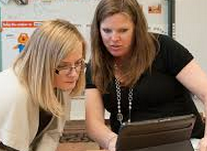
"A person's thinking is more important than the actual event, since the event happens only once, but how he thinks about it repeats again and again in his heart and mind and is shared over and over again with himself and others." -Orrin Woodward
Cognitive Coaching is:
-a nonjudgemental process that honors autonomy, encourages interdependence and strives for high achievement
-a way to help teachers examine the relationship between their perceptions, attitudes, thinking and behaviors
-a professional act that supports teachers in being more resourceful
-used to invite deepening and expansion of the other person's thinking
-a way to invite reflection and self-directedness
Cognitive Coaching is not:
-giving advice or solving other people's problems
1. Cognitive Coaching
The goal of cognitive coaching is to enhance the teacher in becoming more resourceful and self-directed. The cognitive coach acts as a mediator of your thinking. Acting as a sounding board, a mediator helps the teacher become more self-directed with learning. Cognitive Coaching may not always be the appropriate support to offer. There are three other ways in which a coach might offer support. As a collaborator, a consultant, or an evaluator.
2. Collaborator
There are times when a coach needs to collaborate. Collaborating might be used when co-planning a project or meeting, co-brainstorming ideas, and generally working together.
3. Consultant
At times, the coach may need to act as a consultant. Your coach may support you as a consultant when they are offering their expertise.
4. Evaluator
Very rarely, your coach will act as an evaluator. Your coach may fill out the Early Childhood Workshop checklist or other tools to assess the learning environment.
1. Cognitive Coaching was linked with increased student test scores and other benefits for students.
2. Teachers grew in teaching efficacy.
3. Cognitive Coaching impacted teachers' thinking, causing them to be more reflective and to think in more complex ways.
4. Teachers were more satisfied with their positions and with their choice of teaching as a profession.
5. School cultures became more professional.
6. Teachers collaborated more.
7. Cognitive Coaching assisted teachers professionally.
8. Cognitive Coaching benefited teachers personally.
9. Cognitive Coaching benefited people in fields other than teaching.
Edwards, J. (2012). Cognitive Coaching: A synthesis of the research.
Highlands Ranch, CO: Center for Cognitive Coaching.
This is a time to discuss with your coach what you would like to work on and what you would like to happen. Your coach will help to clarify your goals and mediate a plan and action. During this preconference you and your coach will talk about what your success will look like and how you would like your coach to collect data on your progress.
During the data collection/observation phase, your coach will take the data that you requested during the pre-conference or planning stage. This could be a checklist, video, tally etc. The coach and teacher agree on what data to collect and how to collect the data--specificity is important.
During the reflection, the teacher and coach summarize impressions and recall information and data is shared and discussed. The coach will use paraphrasing and probing questions to support new learning and discuss next steps.